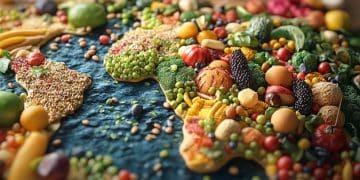The Truth About Carbs: Are They Really the Enemy? Unveiling Facts

The Truth About Carbs: Are They Really the Enemy? Many diets demonize carbohydrates, but understanding their role is crucial. This article explores different types of carbs and their impact on health, helping you make informed dietary choices and separating fact from fiction.
Are carbs the dietary villains they’re often made out to be? The truth about carbs is far more nuanced than the simple “good vs. bad” dichotomy we often hear. Many popular diets villainize them, but are they really the enemy?
This article will delve into the truth about carbs: Are they really the enemy? We’ll explore the different types of carbohydrates, their functions in the body, and how to make informed choices about incorporating them into a healthy diet.
The Truth About Carbs: Are They Really the Enemy? Understanding the Basics
Carbohydrates are one of the three macronutrients, alongside proteins and fats, that provide our bodies with energy. They are found in a wide range of foods, from bread and pasta to fruits and vegetables. But what exactly are carbs, and why are they so often targeted in weight loss diets?
Types of Carbohydrates
Not all carbs are created equal. Understanding the different types is key to making healthy choices:
- Simple Carbohydrates: These are sugars, both natural (like those in fruit and milk) and refined (like those in processed foods and sugary drinks). They provide a quick burst of energy but can lead to blood sugar spikes and crashes.
- Complex Carbohydrates: These are starches and fiber found in whole grains, vegetables, and legumes. They take longer to digest, providing a sustained release of energy and promoting feelings of fullness.
- Fiber: Although technically a carbohydrate, fiber is indigestible. It plays a crucial role in digestive health, regulating blood sugar levels, and lowering cholesterol.

Therefore, the truth about carbs: Are they really the enemy? lies in understanding the different types and making informed choices. Consuming more complex carbohydrates and fiber while limiting simple sugars is generally recommended for optimal health.
The Role of Carbs in the Body
Carbohydrates play several vital roles in the body, extending far beyond simply providing energy. They are the primary fuel source for the brain and muscles, and they also contribute to various metabolic processes and overall health.
Energy Production
The body breaks down carbohydrates into glucose, which is then used for energy. This process is essential for powering our daily activities, from walking and talking to thinking and exercising.
Brain Function
The brain relies heavily on glucose for energy. A steady supply of carbohydrates is necessary for maintaining cognitive function, focus, and mental clarity.
Muscle Function
Muscles also use glucose for energy, especially during physical activity. Carbohydrates are stored in the muscles as glycogen, which can be quickly converted back into glucose when needed.
Without an adequate intake of carbohydrates, the body may start to break down muscle tissue for energy, which is not ideal for overall health and fitness.
The Glycemic Index and Glycemic Load
The glycemic index (GI) and glycemic load (GL) are tools used to measure how quickly a food raises blood sugar levels. Understanding these concepts can help you make smarter carbohydrate choices.
Glycemic Index (GI)
The GI ranks foods on a scale of 0 to 100, with higher numbers indicating a faster rise in blood sugar. Foods with a low GI (55 or below) are digested and absorbed more slowly, leading to a gradual increase in blood sugar. Foods with a high GI (70 or above) cause a rapid spike.
Glycemic Load (GL)
The GL takes into account both the GI of a food and the amount of carbohydrates it contains. This provides a more accurate picture of how a food will affect blood sugar levels. Foods with a low GL (10 or below) have a minimal impact on blood sugar, while those with a high GL (20 or above) can cause significant spikes.
Choosing foods with low GI and GL values can help stabilize blood sugar levels, prevent energy crashes, and promote overall metabolic health.
Debunking Common Carb Myths
Many misconceptions surround carbohydrates, leading people to unnecessarily restrict their intake or demonize certain foods. Let’s address some common myths and clarify the truth about carbs: Are they really the enemy?
Myth: Carbs Make You Fat
This is a common misconception. Weight gain is primarily determined by calorie balance, not just carbohydrate intake. Eating more calories than you burn, regardless of the source, will lead to weight gain. Carbohydrates, especially complex ones, can be part of a healthy weight management plan when consumed in moderation.
Myth: All Carbs Are Unhealthy
As we’ve discussed, not all carbs are created equal. Refined sugars and processed foods should be limited, but whole grains, fruits, and vegetables are nutrient-rich sources of carbohydrates that provide essential vitamins, minerals, and fiber.
Myth: Low-Carb Diets Are Always the Best
Low-carb diets can be effective for some people, especially in the short term. However, they are not necessarily the best choice for everyone. The ideal carbohydrate intake varies depending on individual factors such as activity level, health goals, and personal preferences. Many people thrive on a diet that includes a moderate amount of complex carbohydrates.

How to Choose Healthy Carbs
So, how do you navigate the world of carbohydrates and make healthy choices? Focusing on whole, unprocessed foods is a great place to start.
Prioritize Whole Grains
Choose whole grains over refined grains whenever possible. Opt for brown rice instead of white rice, whole wheat bread instead of white bread, and oatmeal instead of sugary cereals.
Load Up on Fruits and Vegetables
Fruits and vegetables are excellent sources of carbohydrates, fiber, vitamins, and minerals. Include a variety of colorful produce in your diet to reap the numerous health benefits.
Read Food Labels Carefully
Pay attention to the added sugar content of packaged foods. Limit your intake of sugary drinks, processed snacks, and desserts. Look for products with a high fiber content and minimal added sugars.
Understanding the truth about carbs: Are they really the enemy? involves a balanced approach and making informed decisions about the types and amounts of carbohydrates you consume.
| Key Point | Brief Description |
|---|---|
| 🍎 Types of Carbs | Simple vs. complex carbs; fiber is crucial. |
| ⚡️ Carbs’ Role | Energy for brain and muscles; supports metabolism. |
| 📊 Glycemic Index | Measures how quickly food raises blood sugar. |
| ✅ Healthy Choices | Prioritize whole grains, fruits, and vegetables. |
Frequently Asked Questions
No, not all carbohydrates are bad. It’s important to distinguish between simple and complex carbohydrates. Complex carbohydrates, found in whole grains, fruits, and vegetables, provide essential nutrients and fiber.
Carbohydrates do not directly cause weight gain. Weight gain happens when you consume excessive calories from any source, including carbs, fats, or protein. Moderation and balanced eating are key.
Fiber is a type of carbohydrate that the body can’t digest. It helps regulate blood sugar levels, promotes digestive health, and contributes to feelings of fullness, which can aid in weight management.
Low glycemic index (GI) foods are digested and absorbed more slowly, leading to a gradual increase in blood sugar levels. This can help prevent energy crashes and promote stable energy throughout the day.
Understanding carbohydrate intake is crucial for managing diabetes. Choosing complex carbohydrates, monitoring portion sizes, and pairing them with proteins and fats can help regulate blood sugar levels effectively.
Conclusion
In conclusion, the truth about carbs: Are they really the enemy? is that they are not inherently bad. Understanding the different types of carbs, their roles in the body, and how to make informed choices is essential for maintaining a healthy diet.
By prioritizing whole grains, fruits, and vegetables while limiting refined sugars and processed foods, you can enjoy the benefits of carbohydrates without compromising your health or weight management goals.





